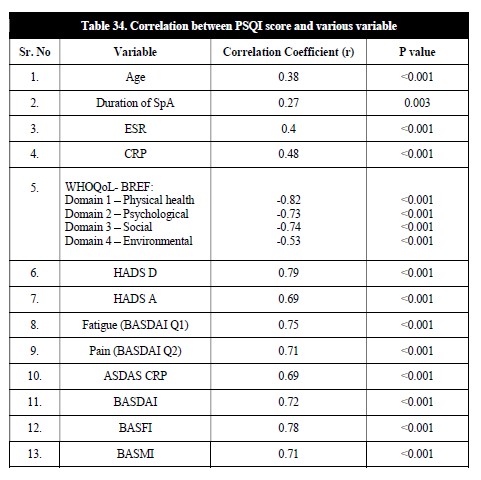Session Information
Session Type: Poster Session C
Session Time: 9:00AM-11:00AM
Background/Purpose: Sleep problems are prevalent in 30-70% of patients with axial Spondyloarthritis (SpA), negatively impacting their quality of life. Poor sleep quality in these patients has been associated with reduced exercise tolerance, worsened pain and fatigue, decreased functional status, and compromised response to therapy. While previous studies have explored the determinants of sleep problems in axial SpA patients, our study is the first in India to assess sleep quality and its components, as well as the influence of various factors on sleep in this population.
Methods: This prospective, cross-sectional study was conducted from March 2021 to September 2022 at the Department of Rheumatology, Indraprastha Apollo Hospital, Delhi. A total of 119 axial SpA patients participated, and sleep quality was measured using the PSQI questionnaire. Bivariate correlations were performed to examine the relationships between sleep quality (PSQI score) and various factors, including age, gender, disease duration, inflammatory markers, quality of life, disease activity, functionality, spinal mobility, anxiety, depression, fatigue, pain, socioeconomic status, and biological usage. Significant variables were included in a multiple linear regression model. Additionally, univariate analysis compared baseline variables and disease activity between patients with good sleep quality (PSQI < 5) and poor sleep quality (PSQI ≥ 5).
Results: Among the participants, 53% experienced poor sleep quality, with a mean global PSQI score of 5.54±4.03. As many as, 73% were not receiving treatment for insomnia. Patients with poor sleep quality had significantly higher scores across all seven dimensions of the PSQI. Sleep latency and subjective sleep quality were the most affected components, while the use of sleep medication was the least affected. Factors associated with poor sleep quality included older age, longer disease duration, smoking, radiographic evidence of sacroiliitis, hip disease, elevated inflammatory markers, low back pain, fatigue, high disease activity, poor functional status, increased spinal mobility limitation, anxiety, and depression (table 1). Gender, socioeconomic status, use of conventional DMARDs and biological therapy, enthesitis, and daytime sleepiness did not significantly influence sleep quality. Multivariate analysis revealed that limitations in spinal and hip mobility (OR: 3.76 [1.53-9.24]), fatigue (OR: 1.99 [1.27-3.11]), and depression (OR: 1.63 [1.10-2.41]) were independent risk factors for poor sleep quality.
Conclusion: Our study highlights the high prevalence of poor sleep quality in patients with axial SpA, despite limited utilization of insomnia treatments. Emotional factors such as fatigue and depression, as well as limitations in spinal and hip mobility, were identified as contributors to sleep problems in these patients. The complex relationship between sleep quality, emotional disorders, and disease activity underscores the importance of a multidisciplinary approach to managing axial SpA.
To cite this abstract in AMA style:
Budumuru S, Handa R, Upadhyaya S, Gupta S, Shah M, Shah M, Aggarwal A. Relationship Between Sleep Quality, Disease Activity, and Psychological Factors in Patients with Axial Spondyloarthritis: A Cross Sectional Study [abstract]. Arthritis Rheumatol. 2023; 75 (suppl 9). https://acrabstracts.org/abstract/relationship-between-sleep-quality-disease-activity-and-psychological-factors-in-patients-with-axial-spondyloarthritis-a-cross-sectional-study/. Accessed .« Back to ACR Convergence 2023
ACR Meeting Abstracts - https://acrabstracts.org/abstract/relationship-between-sleep-quality-disease-activity-and-psychological-factors-in-patients-with-axial-spondyloarthritis-a-cross-sectional-study/

